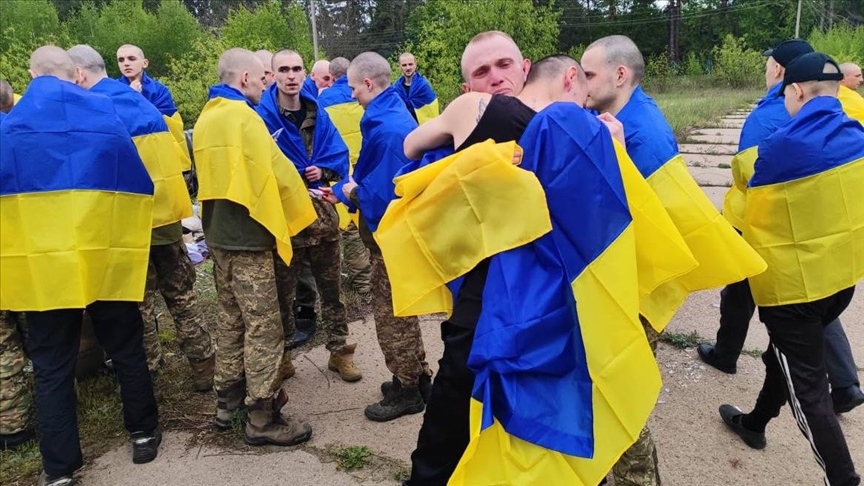On May 23, 2025, Russia and Ukraine initiated their largest prisoner exchange since the onset of the war in February 2022, marking a significant, albeit tentative, step toward renewed diplomatic engagement. This exchange, involving the release of 1,000 prisoners from each side, was the first substantial outcome of recent peace talks held in Istanbul—the first direct negotiations between the two nations in over three years.
The prisoner swap was structured to occur in three phases over three days. In the initial phase, Ukraine welcomed back 390 individuals, comprising both military personnel and civilians. Concurrently, Russia received 270 military personnel and 120 civilians. The exchange took place at the Belarusian border and was confirmed by Ukrainian President Volodymyr Zelenskyy, who expressed gratitude to all parties involved.
The second phase of the exchange occurred on May 24, with each side releasing an additional 307 soldiers. This brought the total number of individuals exchanged to nearly 700, with the final phase expected to complete the agreed-upon 1,000-for-1,000 swap.
The return of prisoners was met with emotional scenes across Ukraine. Families, some of whom had been waiting for over three years, were reunited with their loved ones. Among the released was Andrii Derektorenko, whose wife, Ellia, had endured years of uncertainty. However, many families continue to search for missing relatives, relying on information from newly released prisoners and holding onto hope for future reunions.
Former captives recounted harrowing experiences during their detention, including prolonged periods without communication, false promises of release, and psychological abuse. These accounts underscore the ongoing humanitarian challenges faced by prisoners of war and their families.
The prisoner exchange emerged from direct talks in Istanbul, which, despite being the first in years, yielded limited progress on broader peace negotiations. Russia's demands, including recognition of annexed Ukrainian territories and a commitment to neutrality, remain unacceptable to Ukraine. President Zelenskyy has firmly rejected these terms, viewing them as threats to Ukraine's sovereignty.
Former U.S. President Donald Trump played a role in facilitating the Istanbul talks, advocating for a 30-day ceasefire and expressing optimism about the potential for peace. However, Ukrainian officials remain cautious, feeling increasingly isolated as international support appears to waver.
Despite the prisoner exchange, hostilities between Russia and Ukraine persist. On May 24, just hours after the second phase of the exchange, Russia launched a massive aerial assault on Kyiv, deploying approximately 250 drones and 14 ballistic missiles. The attack caused widespread damage and injuries across multiple districts of the city, highlighting the fragile nature of the current situation.
Ukrainian President Zelenskyy condemned the strikes as targeting civilians and reported casualties in several regions beyond Kyiv, including Odesa, Kharkiv, and Dnipro. The assault underscores the challenges facing any potential ceasefire or peace agreement.
The United Arab Emirates (UAE) has played a significant role in mediating prisoner exchanges between Russia and Ukraine. Since taking on the role of mediator at the start of 2024, the UAE has overseen the exchange of more than 3,700 prisoners of war, illustrating its growing diplomatic engagement in the conflict.
The UAE's involvement has been instrumental in facilitating communication between the two sides, focusing on humanitarian concerns and building trust through discreet diplomacy. This approach has enabled the successful execution of multiple prisoner swaps, even as broader political talks remain stalled.
The recent prisoner exchange between Russia and Ukraine represents a significant humanitarian achievement and a rare moment of cooperation amid ongoing conflict. While it offers a glimmer of hope for renewed diplomatic engagement, the continuation of hostilities and the complexity of political demands highlight the challenges that lie ahead. The involvement of international mediators like the UAE underscores the importance of neutral parties in facilitating dialogue and humanitarian efforts during times of war.
As the conflict enters its fourth year, the international community continues to watch closely, hopeful that such exchanges may pave the way for more substantive negotiations and, ultimately, a resolution to the war.
Key Takeaway
On May 23, 2025, Russia and Ukraine initiated their largest prisoner exchange since the onset of the war in February 2022, marking a significant, albeit tentative, step toward renewed diplomatic engag
